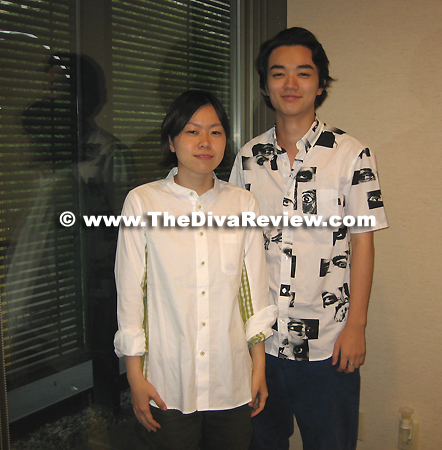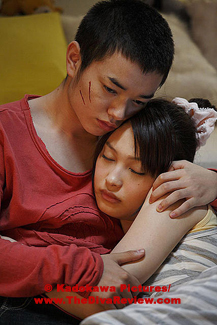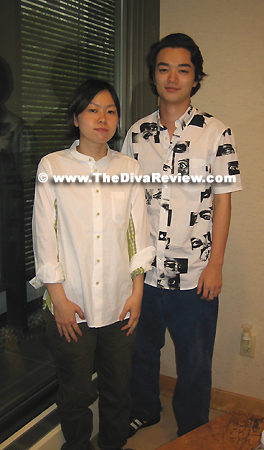
Hey boys and girls, we had the pleasure of an interview with an exciting director and one of the young rising stars of Japanese acting. At NYCís Japan Cuts to present A Liar and a Broken Girl, director Natsuki Seta and actor Shota Sometani discuss complex characters, the art of lying, working with cranky kids and Charlie Chaplin.
Dig it!
A Liar and a Broken Girl
Natsuki Seta and Shota Sometani
 The
Lady Miz Diva: In The Diva Reviewís coverage of Asian film and
filmmakers, Ms. Seta is only one of three female directors from Asia
Iíve interviewed. Are there as few female directors in Japanese film as
it seems?
The
Lady Miz Diva: In The Diva Reviewís coverage of Asian film and
filmmakers, Ms. Seta is only one of three female directors from Asia
Iíve interviewed. Are there as few female directors in Japanese film as
it seems?
Natsuki Seta: I have the impression that there certainly arenít many, but there are a certain number of Japanese female directors. One that comes to mind is Ogigami Naoko, a very prominent director. But it is true there are certainly not many female directors, especially those older than me. I think one of the reasons is the Japanese film industry is so draining and itís a physical strain to survive. I wasnít originally always intending to be a director, so I didnít experience the rigor quite as much that the older generation had to deal with that.
LMD: Were you surprised to be invited to present your film at the Japan Cuts festival here in New York City?
NS: Yes, very surprised!
 LMD:
How did you both first become involved with A Liar and a Broken Girl?
LMD:
How did you both first become involved with A Liar and a Broken Girl?
NS: Well, thereís the original story, of course, and it was brought to me by the producer. The original story was aimed toward middle school students; the younger generation. Itís very complex, and I read it and loved it and I thought it was very extraordinary and a very unexpected story. I thought itís going to be very hard to visualise, but if I was successful in visualising it, it would be something that has never been seen before as a film. But the second problem was these are such complex characters, there are not many actors that would be able to portray them, but Mr. Sometani was perfect, so thatís how we got started.
Shota Sometani: Iíve always been a fan of Ms. Seta. Iíve seen two of her films before, A Letter from Elsewhere and Whatís Done is Done, and I just loved those films and I felt very fortunate to be involved.
LMD: What did you think when you initially read this very complex character?
SS: My first impression was I thought this was going to be a very difficult character to portray, but once I started, it was not difficult. As I progressed on the set, I could just naturally understand what my character was going through as he seemed to me.
LMD: Had you read the original novel?
SS: No, the director specifically told me not to read it.
LMD: Why did you request that, Ms Seta?
NS: One of the reasons why I didnít want him to read the novel is because the character in the novel is just so vivid. I didnít want him to be unbelievable as a character; I wanted him to be a little more human than is depicted in the book.
LMD: This is a film you really have to stick to in order to get the truth of it in many ways. At first I really didnít understand the character of Ma-chan, but slowly you see her motivations and you find sheís not what you mightíve thought. Was that very slow, risky reveal of the truth your plan all along?
NS: Of course I definitely wanted to you to like her eventually. {Both laugh} In the process, you get to see her tragic side and I wanted that to be suspenseful, but the truth.
 LMD:
Did you have any hesitation about breaking fourth wall and possibly
taking the viewer out of the experience with Mi-kunís turning to the
audience and saying ďThatís a lieĒ whenever he fibs?
LMD:
Did you have any hesitation about breaking fourth wall and possibly
taking the viewer out of the experience with Mi-kunís turning to the
audience and saying ďThatís a lieĒ whenever he fibs?
NS: Thatís an element of the book. In the book, itís just the voice of his heart. But to depict that in the film was a little difficult; we couldíve done a voice-over narration, or a monologue, but thatís not as interesting, so I decided to do this close communication between the viewer and Mi-kun, just to add a little bit of spice to the film. I was very much influenced by Woody Allen in that element.
LMD: Mr. Sometani, how would you describe Mi-kun to someone who hadnít seen the movie?
SS: Pure. Heís too pure and itís startling how pure he is to me.
LMD: And he bounces, like in the scene where he takes a leap off the building.
SS: Thatís because heís so pure.
NS: I think heís a hero that wonít die.
 LMD:
Mr. Sometani has great chemistry with his co-star, Aya Omasa, as well as
the two children in the apartment scenes. How much time did you have to
rehearse?
LMD:
Mr. Sometani has great chemistry with his co-star, Aya Omasa, as well as
the two children in the apartment scenes. How much time did you have to
rehearse?
NS: When we were all together, Mr. Sometani, Ms. Omasa and the kids together was just a total of two days. But when we picked the kids, Mr. Sometani was there and we saw the chemistry with the kids and which ones he felt most comfortable with. We took a long time with just the kids.
LMD: Those children are wonderful.
NS: They were crying a lot on set. They were tired and bored and frustrated.
LMD: What was it like for you to work with such young children, Mr. Sometani? At age nineteen, youíre practically an old man compared to them.
SS: I mean, you canít win against children. They act without thinking, so I cannot win against that. They donít think about anything thatís redundant.
LMD: Does it make you more conscious of your acting to balance that naturalness out?
SS: I actually let the kids bring it out of me naturally. They really helped me.
LMD: You mentioned Woody Allen influencing this film. What other directors have you been influenced by?
NS: I have too many! Of course my professors, Kiyoshi Kurosawa and Takeshi Kitano, Iím indebted to them, as well as Spielberg, Tim Burton, Jim Jarmusch.
LMD: And who made you first want to become an actor, Mr. Sometani?
SS: Chaplin.
LMD: How did you discover Charlie Chaplin?
SS: I was about three years old in preschool and I saw him on cable TV. It was of course a black and white silent film, but thatís one of the reasons I was fascinated as a child. I instinctively knew he was amazing.
LMD: Actually, having seen this film that makes a lot of sense to me because you express a lot without saying very much. Were there other silent film actors you were moved by?
SS: Of course, I love silent films and the director recommended that I watch Buster Keatonís films before shooting.
LMD: Youíve already made many films in a short time; do you feel a difference being directed by a female director rather than a male?
SS: Itís completely different. I mean, I feel that females have a sensibility that men do not have. And as an actor, thatís very striking for me when Iím working with a female director.
LMD: Mi-kun goes through so much, giving everything to protect someone. Is that something you could relate to in your own life?
SS: Iíd love to empathise with him, but I cannot. {Laughs} But I admire him and I aspire to be like him.
LMD: What would each of you like for audiences to take away from A Liar and a Broken Girl?
NS: What I would like them to see is that Ma-chan and Mi-kun will always meet, no matter what happens. And despite whatever happened in the past, or what awaits in the future, I want them to know that they are happy together. And itís all about perception; as long as they perceive themselves to be happy, they are. Itís a matter of mind.
SS: What I would like them to feel is that of course the present is reliant on the past, but in spite of that, the present also influences the future. So as long as the present is happy, there is a possibility that the future can be happy despite the tragic past.
LMD: Mr. Sometani, Iím surprised that at your young age, you took such a multifaceted role as Mi-kun. Do you look for complex characters when you choose scripts?
SS: Yes, I love complexity, and I also tend to be offered roles that are very complex. {Both laugh}.
LMD: Why do you think that is?
SS: People always tell me that they canít really tell what Iím thinking, but more often than not, Iím not thinking anything. {Laughs}
LMD: What future projects do you have coming up?
NS: Iím preparing another project, but I have no idea when Iíll get to it. We have to establish a producer.
SS: Iím the star of Himizu, which is directed by Sion Sono. It was originally a comic book and I play a character who murders his own father and I take a knife and set out, determined to kill unnecessary human beings. Itís planned to be out next February.
 LMD:
Could each of you please give our readers a message about A Liar and a
Broken Girl?
LMD:
Could each of you please give our readers a message about A Liar and a
Broken Girl?
NS: This is my very first commercial film, so I hope a lot of people will get to see it.
SS: I predict that the reactions of the western audience will be entirely different from the Japanese ones, so thatís one of the reasons why I want as many people to see it.
NS: We also want to come back to New York!
SS: Definitely!
~ The Lady Miz Diva
July 16th, 2011
© 2006-2022 The Diva Review.com
|
|











